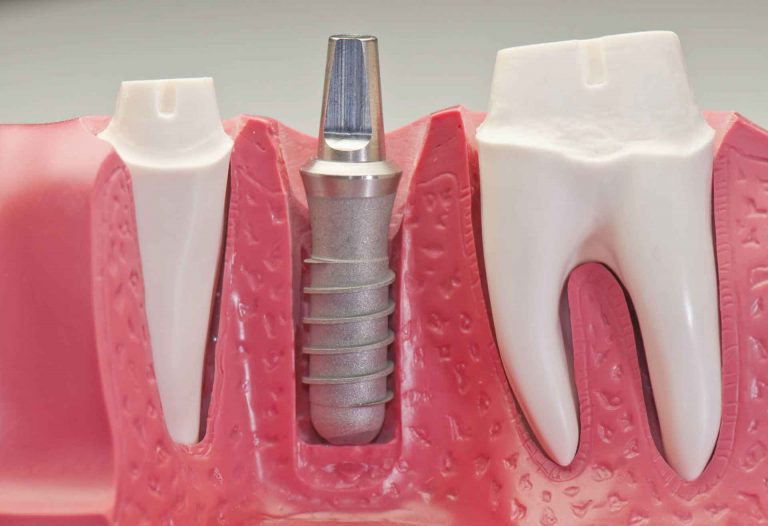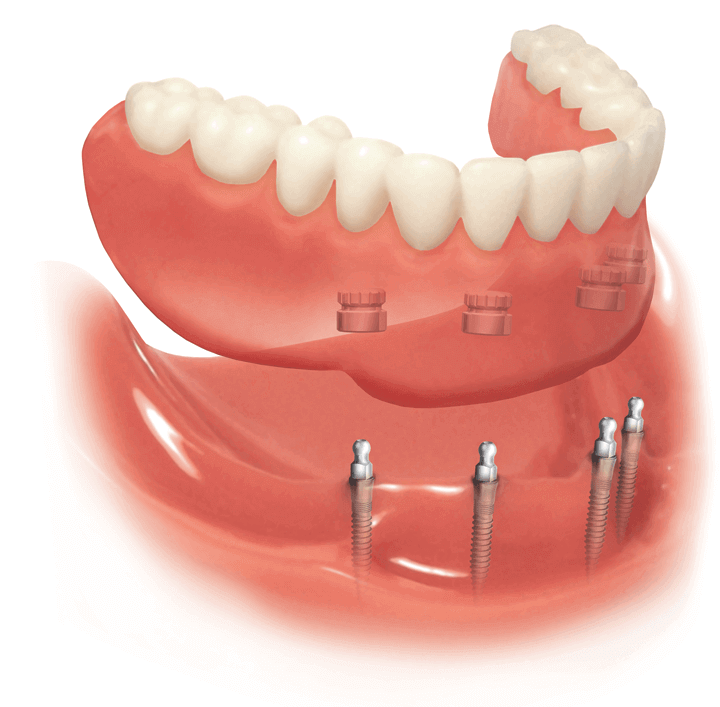Are you suffering from an infected, non-vital, dead, or abscessed tooth? If yes, your dentist may recommend you for a dental implant or root canal to fix the issue. Both dental implants and root canals are different solutions to the same dental problem with a high success rate.
Now your teeth in question are in your mouth and you have two treatment options. But how to identify which option will be better for you? Let’s have an overview of each dental treatment procedure.
What Is Root Canal Therapy?
Root canal therapy treats the teeth with dead nerves or pulp. Your dentist will save severely decayed teeth by removing and cleaning the infected pulp or nerve tissues. Then, he will fill it with the replacement material. Hence, root canal treatment mummifies your teeth to retain and restore them. Your dentist can combine this treatment process with a dental crown if necessary.
What Is Dental Implant?
A dental implant involves the process of removing your original tooth and installing a metal post or implant in your jawbone. It removes your damaged or decayed teeth rather than repairing them, unlike the root canal treatment. Then, your dentist will screw a dental crown to help you chew normally.

When Is a Root Canal Necessary?
A root canal is necessary when the pulp, the innermost part of a tooth, becomes infected or damaged. The pulp can be affected by various factors, including:
- Tooth Decay:When decay progresses deep into the tooth, it can reach the pulp, leading to infection and inflammation.
- Trauma:A physical injury or trauma to a tooth can damage the pulp without visible external signs of damage.
- Cracks or Fractures:Cracks or fractures in a tooth can create pathways for bacteria to reach the pulp, causing infection.
- Repeated Dental Procedures:Teeth undergoing multiple dental procedures or restorations may be at higher risk of pulp damage.
When Are Dental Implants Advised?
You are advised to consider dental implants in several situations, primarily when you have missing teeth or require tooth replacement. Here are some common scenarios where dental implants may be recommended:
- Single Tooth Replacement: A dental implant can provide a stable and natural-looking replacement if you have a single missing tooth. This is a typical situation where an implant is advised to restore oral function and aesthetics.
- Multiple Teeth Replacement: Dental implants can be recommended for multiple missing teeth. They can be used individually or with implant-supported bridges, offering a durable solution for partial tooth loss.
- Full Arch Replacement: In cases where you have lost all the teeth in an entire arch, dental implants may be advised for complete arch restoration. Procedures like All-on-4 or All-on-6 use a limited number of implants to support a complete set of teeth.
- Tooth Extraction: Following tooth extraction due to damage, infection, or other dental issues, dental implants may be recommended for long-term replacement. In some instances, immediate implant placement after extraction is considered.
- Enhancing Denture Stability: If you wear removable dentures and face issues with stability, comfort, or movement, dental implants can be advised for implant-supported dentures. Implants secure the dentures in place, providing a stable and functional solution.
Root Canal Procedure Vs Dental Implant Procedure
Rooth Canal Procedure:
- The dentist or endodontist (a specialist in root canal procedures) numbs the tooth and surrounding area with local anaesthesia.
- An access hole is created in the tooth, allowing the dentist to reach the pulp.
- The infected or damaged pulp is extracted, and the inside of the tooth is thoroughly cleaned and disinfected.
- The empty root canals are filled with a biocompatible material to seal the space and prevent reinfection.
- The access hole is sealed with a dental filling or crown to restore the tooth’s functionality.
Dental Implant Procedure:
- A surgical procedure places the dental implant into the jawbone. It may require multiple stages with a healing period between them.
- An abutment is attached After the implant integrates with the bone during a healing period (osseointegration).
- A custom-made prosthetic crown is placed on the abutment to complete the restoration.
Benefits & Downsides of Root Canal
Some of the benefits of root canal therapy are:
- It Retain Your Natural Tooth
The main benefit of a root canal is that you don’t lose your original tooth, so you can expect to retain your original smile, unlike a dental implant. However, you may need a crown to fix the decay, but your crown will have the original structure to get attached.
- The Process Takes Less Time
The root canal process takes lesser time than a dental implant. However, you will usually require one or two appointments to complete the process. In addition, you will have to wait a short period to get a permanent crown, if needed.
- You May Have To Pay Less
Another key benefit of the root canal is that you may have to pay between $300 to $2,500, unlike dental implants, which may cost you $3,000 to $4,500. However, insurance policies often cover root canals and crowns, but coverage for implants is difficult to find.
- Painless Treatment Process
Generally, the root canal process is painless with a smooth recovery time. Since your dentist doesn’t remove your tooth, you will not have to worry about feeling pain due to pulling during the procedure. In addition, you will not have to wait for your gums to heal from an extraction.
A root canal therapy also has some downsides, including:
- Your Tooth May Be Too Decayed for the Process
If your tooth is severely decayed or damaged, your dentist can’t perform a tooth canal to save it. In addition, the procedure may carry the risk that the tooth you want to save may not last long.
- Process Complications Can Result In Tooth Loss
You may face complications after the treatment procedure. For example, if all the infected pulp is not removed correctly, it can cause an abscess resulting in tooth extraction.
- It Can be Expensive Without an Insurance
While cheaper than implants, root canals can come at a higher cost without a good insurance policy. If you need the root canal and crown without insurance, your treatment cost may rise too high.
Benefits & Downsides of Dental Implants
Some reasons that may make you choose a dental implant over a root canal are:
- Good Aesthetics
While you have to lose your natural tooth, you can still get great aesthetics with a dental implant procedure. Your dentist can craft the tooth that suits your face and make its colour match your original teeth.
- Functionality Increases
A dental implant can offer you a high level of functionality that may be like your natural teeth. For example, you will not experience any speech issues and can easily eat the foods of your choice. Even better dental implants can over more convenient than your natural teeth.
- Lasts Long
If you consider longevity, an implant is ideal as it can last longer than a root canal and crown. Implants rarely fail and can last decades with good care. However, a root canal may result in tooth failure, or your dentist may need to replace crowns after 5-15 years.
You will want to consider these downsides while deciding on a dental implant:
- Your Insurance May Not Cover Implants
Dental insurance plans often exclude implants. So, you may have to pay between $3,000 to $4,500 for one tooth from your pocket. It may become unaffordable for some.
- Involves Lengthy & Invasive Treatment Process
A dental implant requires a more extensive and invasive process. First, your dentist will remove the natural tooth and allow the gums to heal naturally. Then, you will have to give several dental visits to prepare your jawbone for the process, fix the implants, install artificial teeth, and monitor recovery.
- Longer Recovery Period
You will have to spend time between treatment stages and wait for your mouth to heal. You may have to experience pain and swelling during different stages, and be mindful of the complications that may appear.
Dental Implants Vs Root Canal: How To Make Your Decision
Wondering which option is right for you? Your dentist is the right person to give you the answer. He will consider your dental needs and help you decide between the two. In addition, your choice will depend on your dental issue, budget, and preferences.
If your tooth has severe decay and you are comfortable with the higher treatment cost, you can choose an implant. But if you wish to restore your tooth and understand the risks, a root canal can be less invasive and more affordable.
However, whether you plan to go with a root canal or implant, the experts of Sunshine Dental Group are ready to help. Call us on (03) 9133 8659 or use our online appointment request form for a detailed discussion.
Frequently Asked Questions
Can I replace a root canal with a dental implant?
Like other teeth in your mouth, a tooth that has a root canal treatment is susceptible to decay. So, you should maintain your root canal with good oral hygiene. In addition, your mouth is full of bacteria, and if you don’t keep appropriate oral care, there is a likelihood of tooth decay.
Yes, you can replace a root canal with a dental implant. If your root canal fails, your dentist can recommend you remove the tooth and replace it with an implant. But the replacement depends on various factors, including success chances, insurance coverage, affordability, dental health, overall physical health, etc.
Which procedure hurts more, root canal or implant?
Root canal treatment has a reputation for being painful. However, it is not always the case. It used to be painful when dental anaesthesia was not so reliable and sometimes not even an option.
With sedation dentistry and modern dental anaesthesia, you don’t have to experience pain from either of these treatments. Today, neither dental implant nor root canal therapy causes significant pain or discomfort while you undergo the treatment procedure.
However, once the effect of anaesthesia from your root canal treatment wears off, your tooth may be slightly more painful than its infected stage. But, the pain or discomfort will disappear within a day or two.
On the contrary, dental implant surgery can be slightly less painful or uncomfortable. So, you will likely experience extra discomfort if you get an extraction done and an implant placed.
Root canal or dental implant: which procedure takes a long time?
Generally, both procedures take about the same duration of time. However, the time required for dental implant placement and root canal therapy depends on various situations.
For example, cleaning and filling an infected tooth with multiple roots can take longer. However, a standard dental implant takes less time than root canal therapy. But if your dentist performs an extraction during the implant, it can prolong your treatment time.
In addition, if you have a complicated tooth root, it may take longer to extract. But in root canal therapy, your dentist may have to fill all roots of the same teeth. Hence, the implant procedure is usually faster than the root canal.









